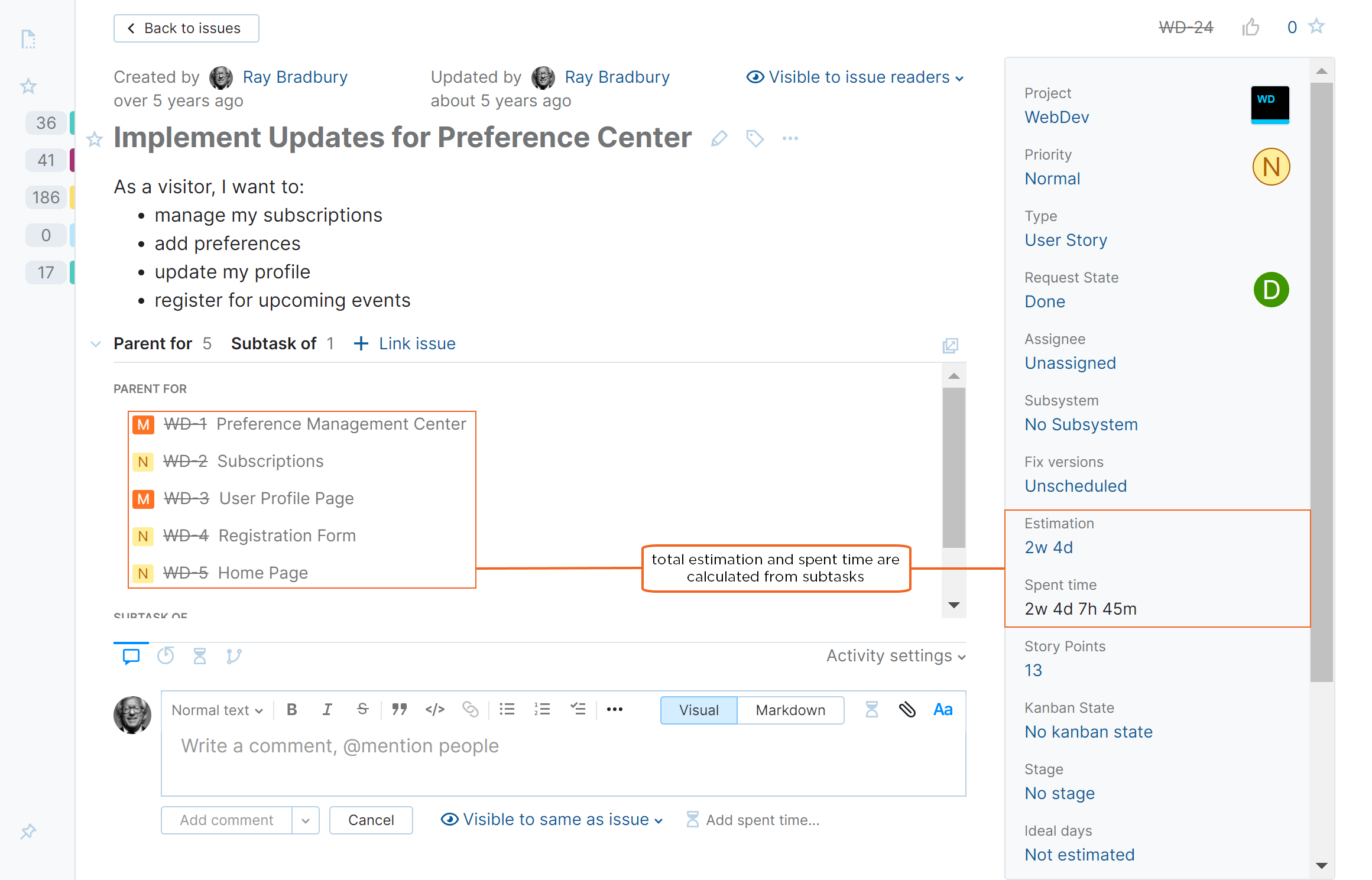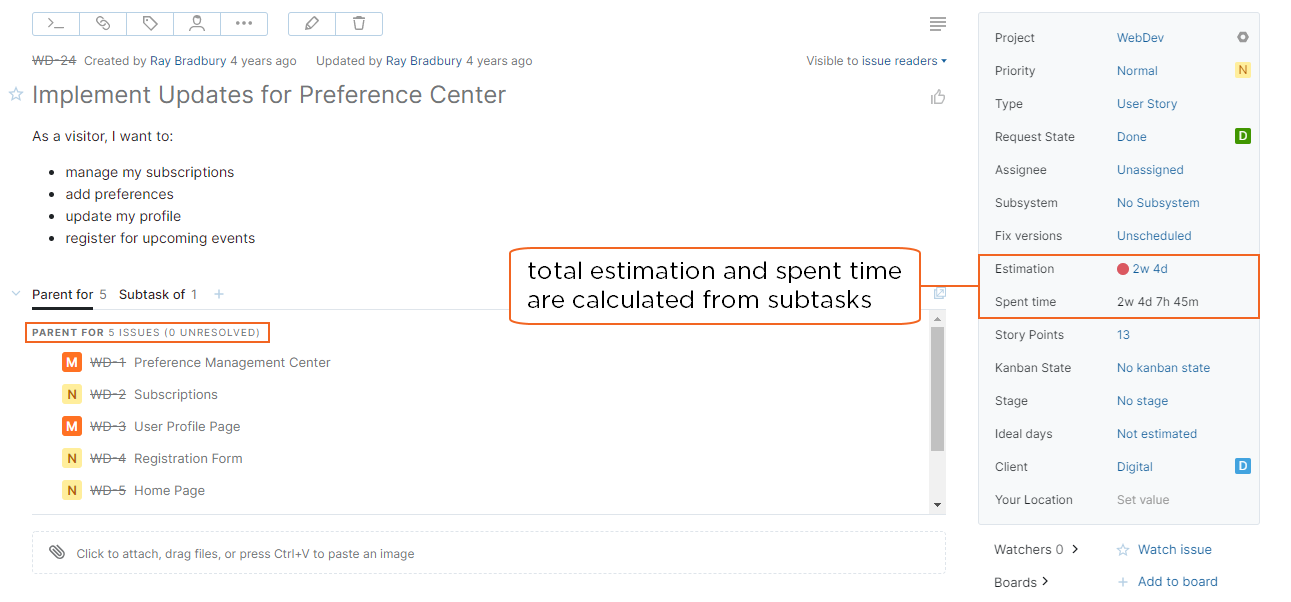Track Spent Time
When time tracking is enabled in a project, you can add work items to issues. You can use this feature to log the amount of time that you spend working on an issue and record the type of work performed.
Spent Time Calculations
The amount of time spent that is entered in each work item is added to a field that stores a period type. The actual field that stores this data is defined at the project level. This field records the total amount of time that is reported for all work items in the issue. You cannot update this value manually — only by adding or editing work items.
Time Left and Overdue Estimations
The amount that is recorded as spent time is compared to the value that is stored in another period type field that stores estimations. The field that stores the estimation presents this calculation in a progress indicator. The amount of spent time that does not exceed the original estimation is drawn in green. The missing piece of the pie represents the amount of time that is left over. The time left and estimation are displayed in a tooltip when you move the pointer over the progress indicator.

When the spent time exceeds the original estimation, the progress indicator is drawn as a red circle. The tooltip displays the amount of spent time that exceeds the original estimation.

Synchronization Between Tasks and Subtasks
For issues that are linked as the parent for other issues, YouTrack automatically calculates the estimation and spent time as the sum of values that are added to each subtask.
If you add work items to a parent task, the spent time in the parent task includes spent time from work items that are added to the parent task plus the total spent time for each of its subtasks. For this reason, we generally recommend that you avoid adding work items to parent tasks.
If you change the estimation for a parent task, the synchronization between the parent task and its subtasks is broken. To restore the synchronization and calculate the estimation for the parent task automatically, set the estimation value in the parent task to the total estimation for each of its subtasks.
Add Work Items to Issues
If time tracking is enabled in the project, spent time is visible in the activity stream. These events are visible when the Spent time filter is enabled.
To add a work item to an issue:
Open the issue in single issue view or quick view.
Click the Add spent time link below the input field for comments.
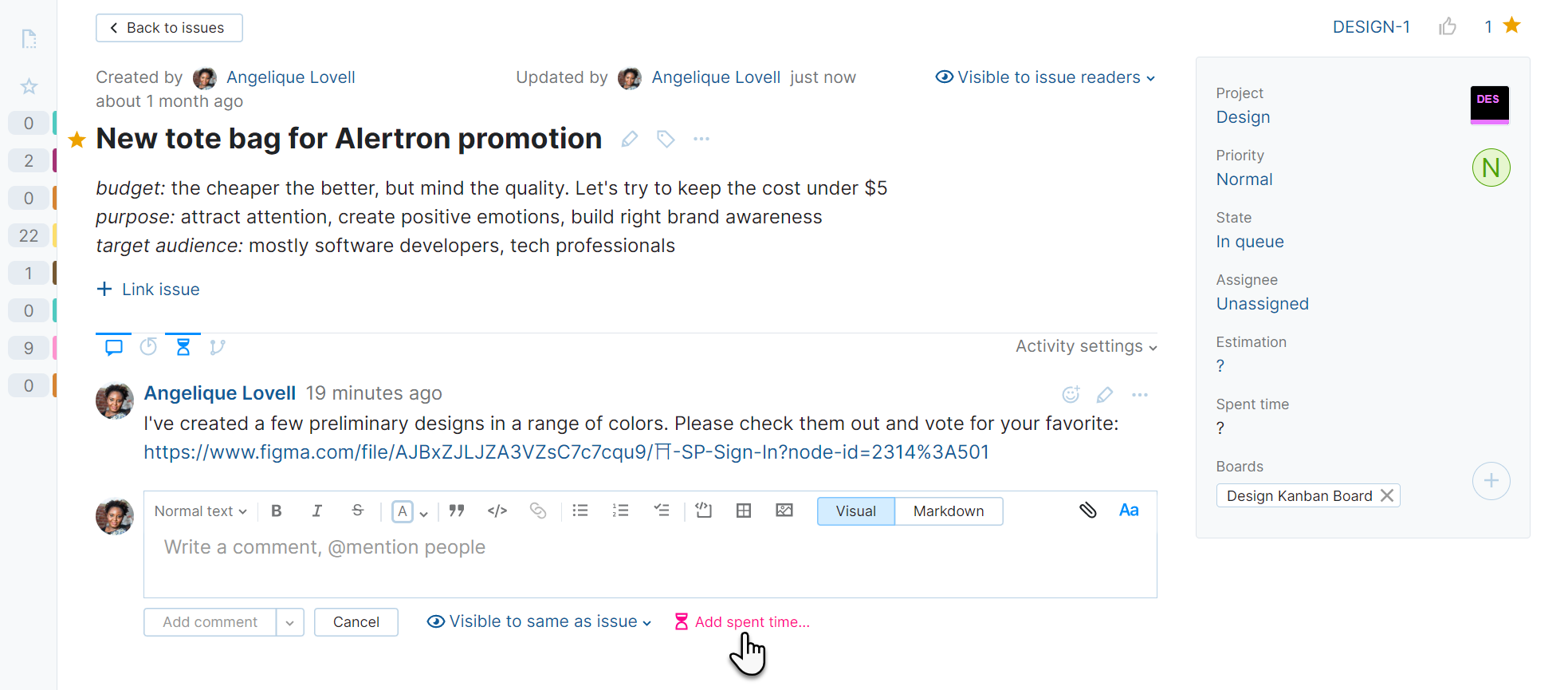
The Add spent time dialog opens.
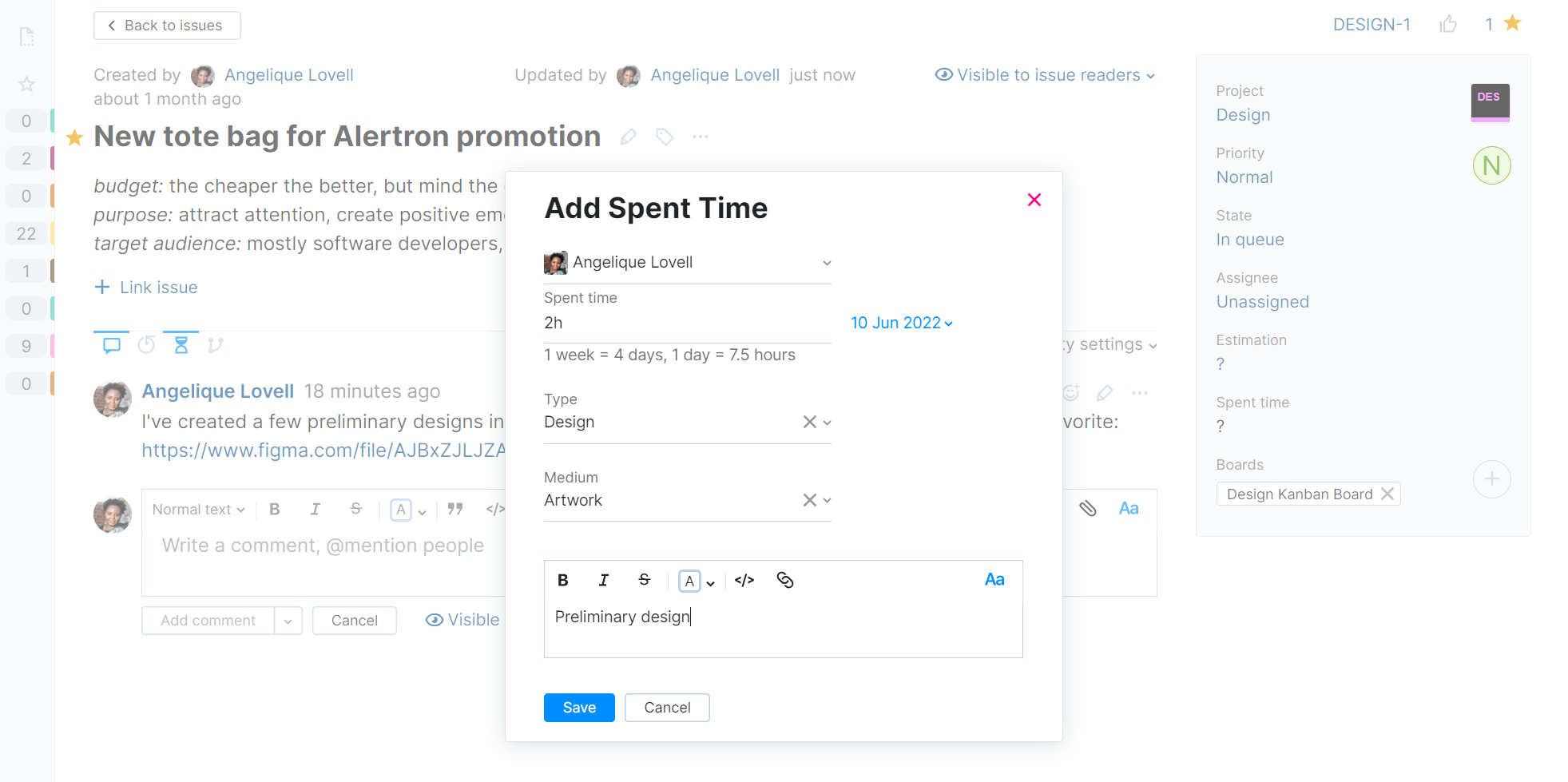
Fill out the fields in the form. Use the following information as a guide:
Your user account is automatically set as the work author.
If you have the Create Not Own Work Item permission in the current project, you can set another user as the work author. To report spent time on behalf of another user, select another user from the list.
Spent time is recorded as a series of whole numbers followed by a letter that represents the unit of time. For example, you can enter either
90mor1h30m. Period values are automatically converted into units of time based on the Period format setting in your YouTrack profile.By default, the work item is assigned the current date. To change the work date, select another date from the calendar.
Assigning values to work item attributes is optional. The list of available attributes is defined on a per-project basis.
The comment is also optional.
Click the Save button.
The work item is added to the issue.
The spent time is added to the custom field that stores this value.
The progress indicator in the field that is used to estimate the total effort is updated.
To add a work item to an issue:
Open the issue in single issue view.
Click the Add spent time link below the input field for comments.
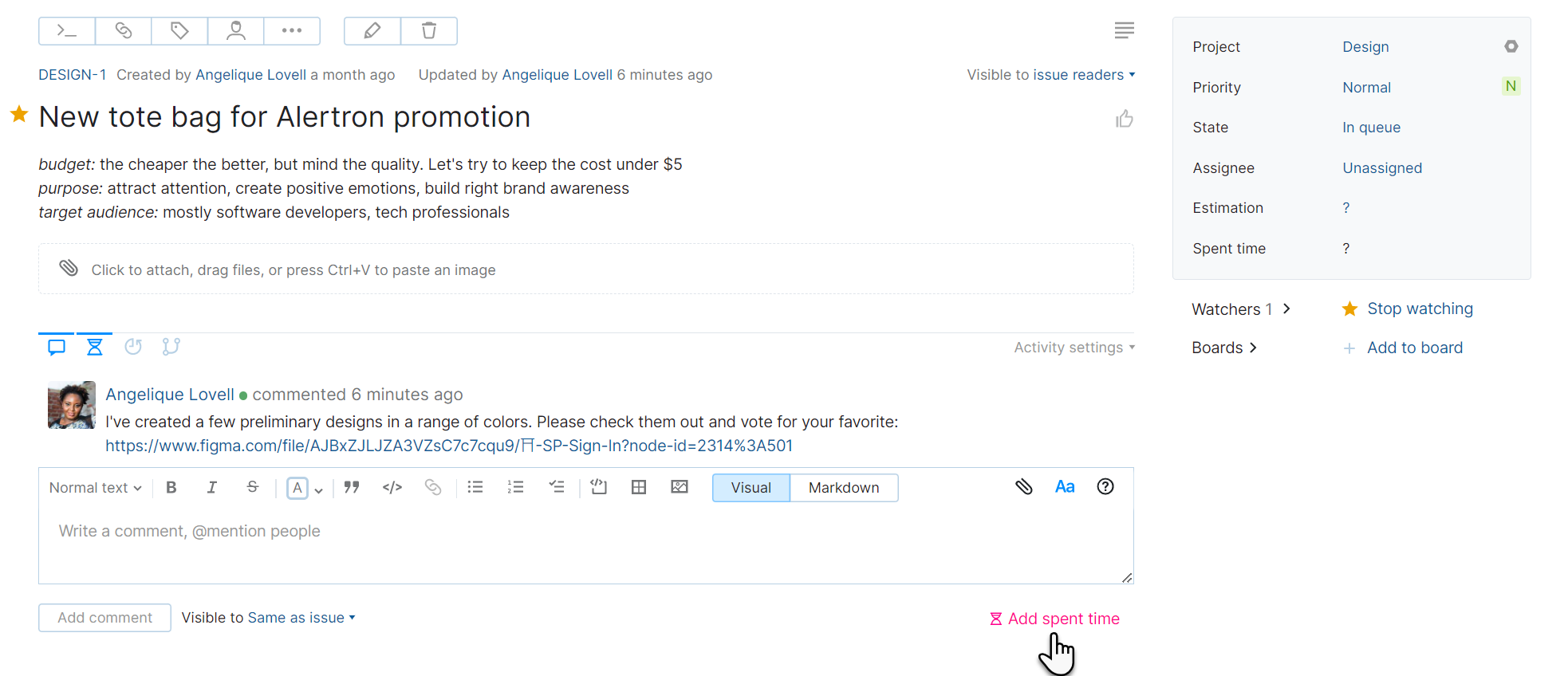
The input field for comments is replaced with the controls for adding spent time.
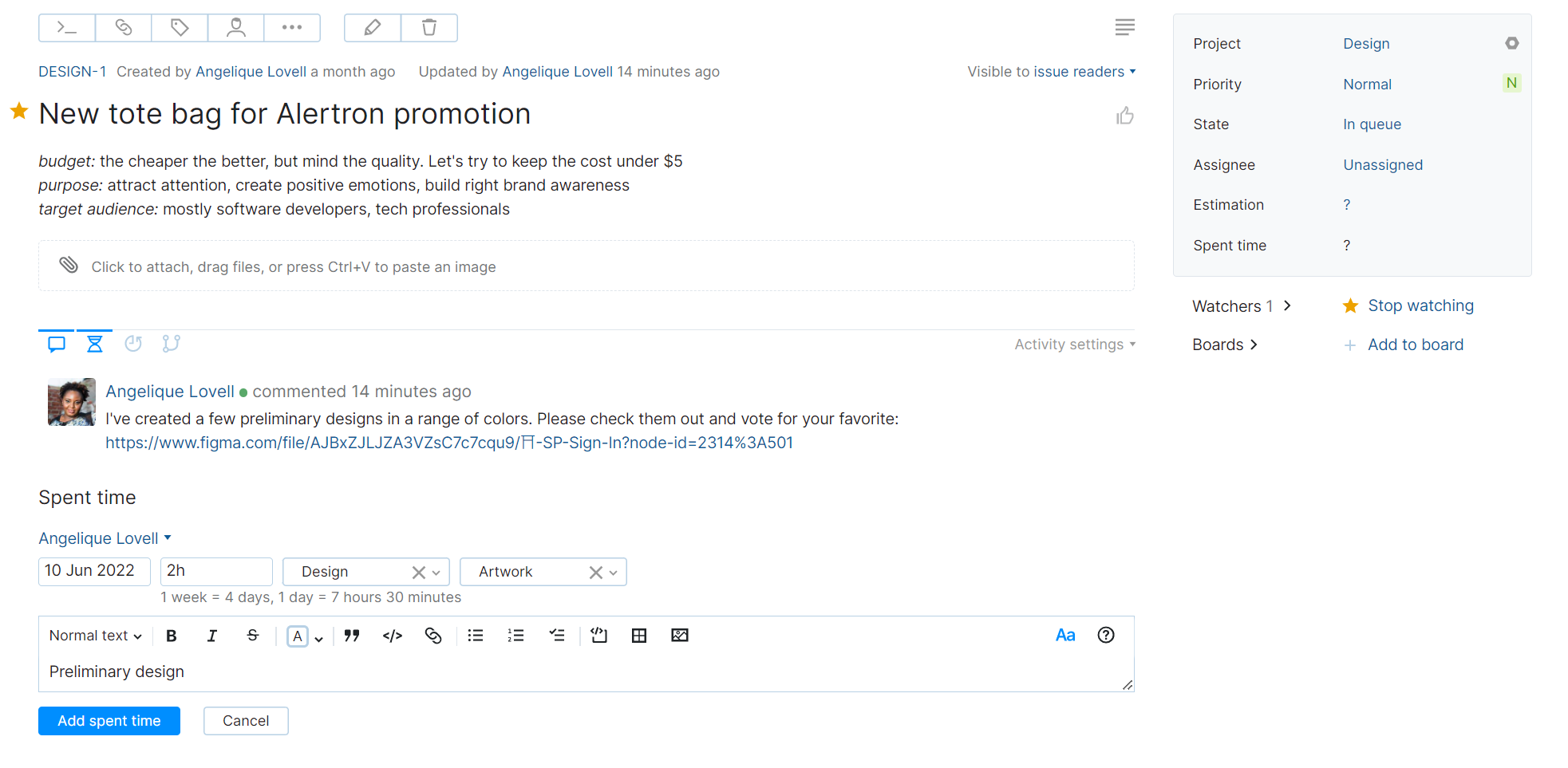
Fill out the fields in the form. Use the following information as a guide:
Your user account is automatically set as the work author.
If you have the Create Not Own Work Item permission in the current project, you can set another user as the work author. To report spent time on behalf of another user, select another user from the list.
By default, the work item is assigned the current date. To change the work date, select another date from the calendar.
Spent time is recorded as a series of whole numbers followed by a letter that represents the unit of time. For example, you can enter either
90mor1h30m. Period values are automatically converted into units of time based on the Period format setting in your YouTrack profile.Assigning values to work item attributes is optional. The list of available attributes is defined on a per-project basis.
The value for the Work type is automatically set to the type that you assigned to your most recent work item.
The work item comment is optional.
Click the Add spent time button.
The work item is added to the issue.
The spent time is added to the custom field that stores this value.
The progress indicator in the field that is used to estimate the total effort is updated.
Add Work Items with a Command
You can use commands to log your work for an issue without having to open it and enter work items manually. You can even add similar work items to multiple issues simultaneously.
To add work items with a command:
Select one or more issues in the Issues list.
Start typing
workto open the Apply Command dialog.Enter a command in the following format:
work [work type] [date] [time period] [description]Use the following parameters to set values for the work item:
Parameter
Condition
Description
[work type]
Optional
Set the value for the default Work type attribute.
[date]
Optional
Set the date with the format
yyyy-mm-dd. If skipped, the current date is assigned to the work item.[time period]
Mandatory
Enter the amount of time spent working on the issue.
[description]
Optional
Enter a description of the work performed.

Enter a comment, if needed.
Click the Apply button.
The work item is added to the issue.
The spent time is added to the custom field that stores this value.
The progress indicator in the field that is used to estimate the total effort is updated.
Add Work Items Automatically
If you manage a project and want your team to track spent time, you can configure your project to log work items automatically.
Enable and configure time tracking in your project. For more information, see Enable Time Tracking.
Attach the In Progress Work Timer default workflow to your project. For more information, see Manage Workflows.
Delete Work Items
If there are work items that you or another user has added by mistake or are no longer needed, you can delete them from an issue.
To delete a work item:
Open the issue in single issue view or quick view.
In the issue activity stream, locate the work item that you want to delete.
Click the Edit icon.
The Edit Spent Time dialog opens.
Click the Delete button.
The work item is removed from the issue.
The spent time is subtracted from the custom field that stores this value.
The progress indicator in the field that is used to estimate the total effort is updated.
To delete a work item:
Open the issue in single issue view.
In the issue activity stream, locate the work item that you want to delete.
Click the Edit icon.
Click the Delete button.
The work item is removed from the issue.
The spent time is subtracted from the custom field that stores this value.
The progress indicator in the field that is used to estimate the total effort is updated.
